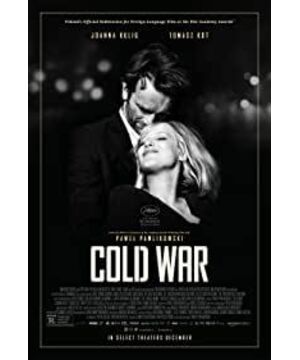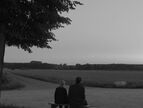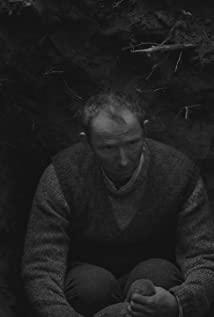2018-06-03 starting number in the public adventure movie and a 100% Rotten Tomatoes, 26 and even fresh, the United States to suffocation!
This year's Cannes Film Festival for best director went to Polish director Pavel Pavlik Khodorkovsky (Paweł Pawlikowski) new book "Cold War" (Cold War / Zimna wojna).
Since "Nun Ida" became popular in 2013, Pavlikovsky is now an art film "upstart" that everyone should fear;
In fact, this name really doesn't match him, who is already 60 years old, but from any angle, he is an excellent example of "late bloomers".
Prior to this, the Polish director had made documentary films for a long time; but the film festival resume was really mediocre, and he could only get a golden Alexander + Fabisci Award at Thessaloniki Film Festival.
The world premiere of "Sister Ada" was held at the Toronto International Film Festival, but it took the world by storm in the next two years, so that there is a joke in the film festival circle that this film "has not participated in any film festival at all. ".
When "Sister Ada" won the European Film Awards, did the film pickers in Locarno and Venice feel regretful when they wanted to come?
So "Sister Ida" actually reminds one thing: Pavlikowski, who has lived in the UK for a long time, must become a Polish in order to be accepted and recognized by major international film festivals (he also moved back to his birthplace, Warsaw) , Now teaching at the Vaida Film School). This is actually a big topic about the cultural politics of the International Film Festival, and it will not be unfolded anymore.
Another aspect of "Sister Ada" is the Holocaust film. Although it is said that "academy controlled by the Jews", it is only natural to send the Oscar best foreign language film to a Holocaust film, but "Sister Ada" Well deserved:
On the one hand, its highly rigorous aesthetic system is really refreshing. It can be regarded as a rare stream under the realism method of the Dane-Romanian New Wave (sell miserable?) that ruled the International Film Festival at that time;
On the other hand, this film has pushed the Holocaust film to a new height, especially in the context of Poland. It no longer blindly pushes the pot to the Nazis, but reflects on the anti-Semitism in Polish culture and asks ordinary Poland. Human responsibility.
Looking at it now, it is not an exaggeration to say that "Nun Ada" is the best movie in the new century.
After winning a bunch of awards, it may be that "Sister Ada" was too successful. After 5 years, Pavlikovsky came up with "Cold War".
It can be seen that he is cautious: there must be aesthetic continuity, but also a pattern, and he cannot repeat himself.
Before the start of Cannes, a few friends joked that this film will win a prize just by looking at the title.
Sure enough, although the signing of this film is average, the "newcomer" who was shortlisted for the Cannes main competition for the first time naturally did not get the C position, but when it comes to the resumption of the game, this position is also considered good, because the first half of Cannes this year is simply lackluster.
"Cold War" was the first week in the first week. The few criticisms I heard were not only saying that it was a "PPT anti-movie", but also "it is another "Nun Ada"" and "too exquisite." "such as.
I can't help but wonder what situation it would be like if it were placed in the rhythm of a big hit every day in the second week.
In fact, you don’t need to write too much about a responsible film review. The presskit of "Cold War" is probably the best brochure ever seen ( downloaded on the Cannes official website ). It can be roughly regarded as a key to the interpretation of the film.
I have everything, let me copy the headings of each part below, and everyone will experience it for yourself:
- Synopsis;
- Victor and Zula, this paragraph is a one and a half page long family card that echoes the ending subtitle "To my father and mother";
- politics;
- music;
- Picture
- 1949-1964: the gap in the story;
- Setting: East and West;
- Hometown and exile;
- "Love is love, nothing more";
Next is the introduction of the main creator, and finally the opening and closing subtitles are attached thoughtfully (really don't be too considerate to reporters who leave early to grab coffee).
To be honest, this is enough to write a paper. It has pre-arranged all the topics of interest to the review, and then provides almost all information including the photographic concept, the location of the scene, the background of the times, and the theme. All the details are clear and blameless.
This is probably the reason why I hesitated for a long time and didn't score a four-star full score. In fact, the film is very similar to the feeling of this brochure. It is impeccably perfect, so it makes people a little uncomfortable because it looks so fake.
This kind of perfection is not the same way as Lee Ang's so-called "top student movie", and even half a position ahead of Uncle An, because the temperament of this high-cold artistic film Uncle An cannot learn. But because there are too many street movies behind, I changed it to full marks.
After all, the level is placed here, and it is the only one to be able to reach this extreme.
When Chinese journalists watched this "Cold War", they all used the expression "Polish version of "Fang Hua"."
Indeed, the first thirty minutes/the first act of the film is simply "Fang Hua".
The opening scene is the scene where the male protagonist Victor and another female musician Ilena go to the folk collection, and then they begin to select actors for the Mazowsze Song and Dance Ensemble.
Victor saw Zura, who was actually not that up to the standards of the national song and dance troupe, but had a desire for performance; but Jelena (probably based on a woman's instinct) thought she was a big trouble.
Of course, Victor still withstood the pressure and chose Zula.
The story of the first act did not unfold in the intrigue of the song and dance troupe. On the contrary, it focused on the process of constructing a "new socialist culture" in a magical style (which is also the best part of Grimlock in my opinion).
Specifically, choosing folk singing and dancing and transforming it in an academic way, and then " instituting it ", is itself a very logical cultural and political behavior:
How to requisition private resources and how to transform them into an essential component of patriotism/nationalism discourse;
And further combine it with politics-the film shows that the singers and dancers in national costumes sing a Stalin hymn in a typical "socialist chorus" (conducted by Victor, and Elena is completely disdainful of this. I took a look, and has since disappeared from this story...)-It is a very typical concrete cultural practice in a former socialist country.
The few strokes and extremely precise writing is really amazing.
The story in the second and third acts focuses on the reversal of the positions of the two. At the beginning of the story, Victor is a people’s musician, and Zula is an anonymous (and bad-born) rural girl.
Then Victor defected to the West while performing in East Berlin and lived in Paris. Zula gradually became the pillar of the song and dance troupe. The two could only meet briefly when Zula went abroad to perform; in special times, The fate of the two people will also be involved in the torrent of the times, and this love is destined to become a tragedy.
Of course, the movie has a rather awkward ending.
The photography still continues the black and white photography of "Nun Ada", the 1.33:1 frame, and the delicate light and shadow composition with a slight depression angle and the frame of the character in the lower half of the frame, but this time there is a significant increase in sports shots. .
In the brochure, the director also jumped out to explain "I am not repeating myself because of this style. I originally wanted to make this movie, but I first made "Nun Ada"." The director said he couldn't imagine. The colors of that era, so black and white can reflect "real life."
But this black and white is not simple. The director has worked hard on the contrast of different scenes.
In short, the director has said everything in the brochure, and the impression is naturally pleasing to the eye. I can’t wait to stop and analyze the composition and light it up. Fortunately, I will be able to see it in China soon.
The music aspect can actually be exaggerated, because this is one of the very few films that can use music with a structural meaning.
When chatting with colleagues at home and abroad in Cannes, everyone generally felt that "you don't have to praise it for good music."
Just one example is that during the period when Zula and Victor were living in Paris, Victor asked Zula to perform in the club and adapted a Polish folk song with jazz. The jazz version of Polish folk songs sung by Zula in the film is very pleasing to the ears. There is also a chorus version in the movie, which happens to be the musical performance of different spaces in the East and West camps: socialist chorus VS capitalist jazz.
This scene can be called the colorful passage of the film, and Zula's performance was a great success. The performance of the heroine Joanna Kulig is superb and radiant.
There is a small detail at the end of the film. When Victor and Zula reunited from prison, Zula just finished her performance, and this time she sang a Latin American style song (Mexico? Cuba?)-here I have not forgotten to add a sum of the diplomatic-led cultural policies of the Eastern European countries at that time!
In short, music occupies a huge space in this movie. After all, it is about the life of a musician, but the director has a very high level of understanding of music, because he is a jazz pianist himself, and shooting a jazz scene is simply Handy and excellent.
On the whole, the director not only can (extremely analytical but also rare and profoundly) reveal the relationship between music and the background of the times and political discourse, but also designed the lens scheduling and the entire visual system based on music, and the best director award deserves it. .
The film’s narrative time spans from 1949 to 1964, and the scenes include Polish villages, labor camps, Warsaw, as well as East Berlin, Paris, Split (the former southern city, now part of Croatia), during the "Cold War" The title is very relevant.
Of course, "Cold War" not only refers to the era, but also refers to the relationship between Victor and Zula. The director said it was inspired by the relationship between parents.
The names of the two protagonists are taken from the director’s parents. The real Victor and Zula died in 1989. According to the director, they “lived together for 40 years, constantly dividing and reuniting, and each other on both sides of the Iron Curtain. "Follow and punish each other", "both are strong and excellent characters, but at the same time a pair of grudges who never cease fighting."
This kind of moody, incompatible, incompatible, and inseparable "complex and chaotic love" is precisely the tragedy of the times, because they are "difficult to live in exile in a completely different culture" and "difficult to live in totalitarianism." Live with dignity under the rule," and at the same time have to resist the temptation of "without dignity."
Here, the relationship between the characters and the background of the times are a perfect reference to each other. It can be said that even if there is no music or an eye-catching form such as the life of an artist, this kind of relationship between the characters and the writing of the times is enough to make a great film.
It can be said that "Cold War" shows us with extremely precise control, even if it is a film with a concept first and a precise calculation, it can reach a certain high level, even a great one.
But its problem is that, as mentioned at the beginning, it is too cold or too precise, and if there is no smoke, there is no sense of intimacy.
In short, a Best Director Award is a fair evaluation for Pavlikovsky, who played in Cannes for the first time.
I guess if there is no accident, Poland will choose this film again this year to send to the Oscars, depending on whether it is the top nine or the top five in the end.
I feel that it will be the rhythm of another round of Cannes films: "Capernaum" claims to have been booked for the best foreign language film at the Oscars, so popular films such as "The Thief Family", "Girls" and "Migratory Birds" will fight again for the Oscars next year?
View more about Cold War reviews











